Ulad Vialichka: The decisions re EaP Summit made by state make Belarus look like outsider

The chairperson of the Coordination Committee of the National Platform of the EaP CSF on the eve of the Summit sums up the results of the first day at Belarusian Human Rights Forum in Vilnius.
Ulad Vialichka, the participant of the Third Belarusian Human Rights Forum in Vilnius, the chairperson of the Coordination Committee of the National Platform of the EaP CSF, the head of the International Consortium “EuroBelarus” in discussion that closes the first day of the event shares his viewpoint on the on the threshold of the Eastern Partnership Summit.
According to Ulad Vialichka, Belarus is now far from being high on the agenda of the Summit.
“There are a number of factors indicating that. For instance, the recent visit of Polish and Swedish Foreign Ministries to Belarus demonstrates the technical level of relations. Secondly, at the beginning of the EaP project all the six countries-members were nearly on the same level, whereas now they have divided into two groups: leaders in the dialog with Europe and outsiders. Belarus belongs to outsiders; and it means that the Summit will be concentrated around Ukraine, Georgia and Moldova. As due to a number of objective factors these countries demonstrate the political will that the outsiders don’t have. Situation with Armenia is more complicated, not to mention Belarus and Azerbaijan”, - Ulad Vialichka said.
At the same time, the EU is now in a state of geopolitical competition with the Russian project of Eurasian integration: “And if the EU has declared that Eastern Partnership is not contrasted with Russia, now it is this Eurasian project that makes the EU search some special approach towards this region. I.e. considering regional geopolitical context Belarus can’t be excluded from the agenda merely because of the importance of the region neighboring with the EU. This is the dual situation we are in”.
As to the Belarusan Foreign Ministry non-participation in the conference “Future EU policies towards Belarus”, which is to take place on October 28-29 in Vilnius, it can be considered a striking example of how official Minsk positions itself in Belarus-EU relations.
“It seems that on the eve of the Eastern Partnership Summit Belarus should have minded that it refuses such invitations, and send at least someone to mark its presence at the conference. However, the demonstrative position was used there, which means that Belarusan side is rather confident in its actions, or, perhaps, has no expectations concerning Belarus-Europe relations from the Summit. I.e. it’s not of high interest and priority for the official Minsk. And, accordingly, Belarus looks like outsider because of the state. Therefore, it is little possibility that these or that segments can be successful in the country that abandons European integration in general”, - Ulad Vialichka emphasized.
As to the Belarusian Human Rights Forum, in the interview with the EuroBelarus Information Service Ulad Vialichka characterized its results as “extremely diverse”.
“The first day was successful in many aspects of the multifaceted Forum, I would say. Perhaps the most interesting for me personally was the first panel discussion, during which the main results of the human rights fighters’ work over the last three years were analyzed. I believe that the reports made by Valiantsin Stefanovich and Elena Tonkacheva the peculiarities and typical events of this period were reflected, as well as the conclusion that it is not enough was made, - Ulad Vialichka said. – I took part in two specialized sections and it seems to me that from time to time the discussion reminded a vicious circle. I.e. instead of defining development zones, the discussion came down to self-presentations and questions like “Are we good or bad? Are we successful or not?”
Vialichka thinks that such forums are rather aimed at putting forward problems and defining challenges with self-criticism.
“Let me indicate that at the Forum a lot of guests who are not from the human rights sphere were present, which, I believe, is a big leap forward. And for us, those who are not human rights fighters, it is an opportunity to understand the context of their work, their concerns, vision of the future and also take part in the creation of this future”, - he said.
Ulad Vialichka also recalled about the Ecological Forum that took place about a week ago in Minsk.
“And there are certain similarities, for instance, the difficulties with overview of the situation, not bringing it to the everyday problems. On the other hand, it is good that both the forums were open for the international community and representatives of communities other than ecological and human rights spheres. I believe that these solutions are right and I hope that the organizers will appreciate their efficiency”, - summed up the head of “EuroBelarus”.
-
03.01
-
07.10
-
22.09
-
17.08
-
12.08
-
30.09








































